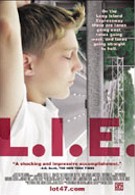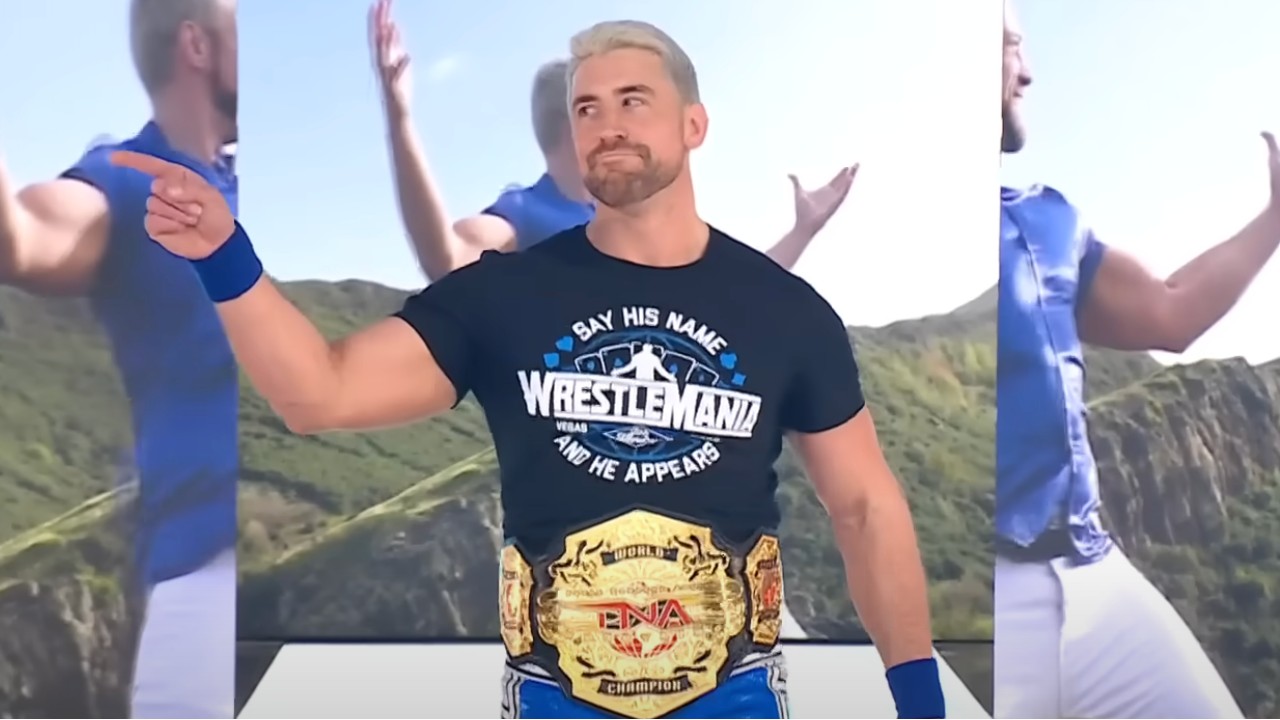Attending college has many unseen perks. Sure, there's the whole education thing, which is all well and good. However, I've just discovered the University of Iowa's indie theater, The Bijou. I'd known about it for quite some time, but I hadn't been able to go until recently. I hoped that this venue would expose me to films that I would otherwise be unable to see in this multiplex-ruled world. With L.I.E., there could be no doubt - this was my cinematic mecca.
L.I.E. (which stands for Long Island Expressway) tells the story of troubled 15-year old Howard Blitzer (Paul Franklin Dano). His mother's dead (taken in a car accident), Dad's a workaholic in trouble with the Feds, and Howie's repressing his burgeoning homosexuality under a facade of false machismo and juvenile delinquency. The movie's not about being gay, though. It's about discovery, and if it has to turn a few tired old sterotypes on their heads, then so be it. Howie robs an old man with a pal of his. Later, when that man, Big John Harrigan (Brian Cox), catches up with him, the two seem to find some connection. Soon, Big John is helping Howie work through his life's problems. Typical Hollywood weepie bullpuckey? Well...not really. Big John, in addition to being a conniseur of life and a pillar of the community, is also a pedophile, looking at the young bruiser to be his next great affair.
Take your "ew" moment now. Get it out of your system so we can continue with the review.
Actually, I was trying to find a softer word than "pedophile" because Cox makes the character wholly sympathetic. It's not that he has no control over what he does - he knows very much what he's doing and enjoys it to some extent. Yet, somehow, I tended to skew his actions (which, by all precepts of a normal society, should be condemned in no uncertain terms) in a more positive light continually. I didn't justify them - nor does the script or Cox. I simply understood the heart of the man. Pretty bizarre, really. Despite his very-not-normal longings, he actually comes off as quite paternal, something that Howie's character is in need of desperately.
Part of what softens Cox's character is that his "targets" are all growing up too fast. It's really a statement on American youth that kids are having sex and worrying about STDs when things, by all rights, should be simpler. There's a sick little running joke about one of Howie's less intelligent friends and his special relationship with his sister. It pops up as a little bit of humor every once and a while, but that laugh has a dark undercurrent to it.
If you want to talk about a great portrayal of a too-short childhood, let's talk Dano as Howie. From the word "go" he gives an entirely realistic peformance. Not the typical Tinseltown "believably heart-wrenching" work, either. There's something to be said for an actor when he can take a fairly angry and seriously flawed character and make them captivating.
Capturing these detailed performances is the lens of newcomer Michael Cuesta. He and cinematographer Romeo Tirone shoot L.I.E. in a distant, matter-of-fact manner so that it sometimes seems like a documentary. The movie also has a slightly bleached look, like something left out in the sun too long. It all works exceptionally well, drawing out elements of the characters that the dialouge leaves out.
Something that I found interesting about this film was the constant use of parallels. The most obvious one is between Big John and Howie's dad - one is somebody who should be reviled that acts like a father figure, and the other should be a father figure, but is really reviled. Also, there's an excellent sequence where Howie is trying to retrieve stolen goods from his friend Gary's lower-middle-income house, while the supposed pal is robbing the protagonist's upper class palace. It shows directly how little the two really share in common.
The movie never bludgeons you on the head with some big message. In fact, it took me a little while for me to understand the specifics of L.I.E.'s point. Everything here is laidback and understated - everything comes out from little details, small nuances. That says a lot for a movie these days, when so-called "great performances" are given by people who are able to over-emote on cue. There's no heart-wrenching moments here, no major moments of life-changing epiphany - the whole situation made me feel, and the lives of all the characters are in constant flux throughout the proceedings.
An excellent example of the quiet power of the film is the opening shot. It's actually out of context, a moment taken from much later in the film. Howie is walking the guardrail on an overpass above the L.I.E.. He stops, spreads his arms, and tenatively sticks out one foot. When I first saw this, I was rather puzzled as to what it meant. I was concerned that this person was going to kill themselves or something. Later, when the film put it in it's proper chronologically place, I was worried sick that Howie might do something drastic. I was emotionally involved with the proceedings, and that says a lot, methinks.
If I have a single thing to say against the film it is that it's slow, methodical pace works against it on occasion. This is especially noticable about 3/4s of the way into the movie, at which point I was beginning to wonder if it was working toward an conclusion at any point. Yes, it did drag for a little bit, but then things hit gear again, and for my troubles I was treated to an excellent (though extremely ambiguous) ending.
Unfortunately, L.I.E. is rated NC-17, meaning that an excellent look at growing adolescents in America can only be seen by adults, who probably won't take as much away from it. Just another example of how the MPAA is out to destroy the notion of film as art, by giving a pornographic film and a searing, issue-laden drama like this the same rating. It doesn't make any sense whatsoever.
I know that some of my readers won't even be able to see this film until it hits DVD, but when it does, seek it out. Beyond all the "important" and "Oscar-nominated" movies, there are little indie films that nobody puts on their voting ballots, but they really should. L.I.E. needs to be seen by a lot more people. I highly recommend it.











